
Bukhara: The Jewel of Uzbekistan's Silk Road
Bukhara, one of Central Asia's oldest cities, is a treasure trove of history, culture, and architecture. Situated along the ancient Silk Road, Bukhara has been a significant center of trade, scholarship, and religion for over two millennia. The city's well-preserved architecture and rich history have earned it a place on the UNESCO World Heritage list. Wandering the streets of Bukhara feels like stepping back in time. The city's historic core is a maze of narrow, winding lanes lined with centuries-old mosques, madrasahs, and caravanserais. The Kalyan Minaret, a towering structure built in 1127, offers stunning views of the city and is a testament to Bukhara's architectural prowess. Nearby, the Lyabi-Hauz ensemble, a tranquil plaza centered around a picturesque pond, is a popular spot for both locals and tourists to relax and soak in the atmosphere. Bukhara is also known for its vibrant bazaars, where you can find everything from traditional textiles and ceramics to spices and jewelry. The bustling atmosphere of the city's markets provides a glimpse into its lively commercial past. For a deeper dive into Bukhara's history, visit the Ark Fortress, which has stood as a symbol of power and authority for centuries. The fortress houses several museums that showcase artifacts from different periods of the city's history. No visit to Bukhara is complete without experiencing its culinary delights. The city's cuisine reflects its diverse cultural influences, with dishes like plov (rice pilaf), shashlik (grilled meat skewers), and various bread and pastry specialties. Bukhara's tea houses are perfect for unwinding after a day of exploring, offering a taste of local hospitality and tradition.
Local tips in Bukhara
- Visit early in the morning or late in the afternoon to avoid the midday heat and crowds.
- Take a guided tour to fully appreciate the historical significance of Bukhara's landmarks.
- Try local dishes like plov and shashlik at traditional restaurants for an authentic culinary experience.
- Wear comfortable walking shoes to navigate the city's cobblestone streets and historic sites.
- Bargain politely at the bazaars to get the best prices on souvenirs.
Bukhara: The Jewel of Uzbekistan's Silk Road
Bukhara, one of Central Asia's oldest cities, is a treasure trove of history, culture, and architecture. Situated along the ancient Silk Road, Bukhara has been a significant center of trade, scholarship, and religion for over two millennia. The city's well-preserved architecture and rich history have earned it a place on the UNESCO World Heritage list. Wandering the streets of Bukhara feels like stepping back in time. The city's historic core is a maze of narrow, winding lanes lined with centuries-old mosques, madrasahs, and caravanserais. The Kalyan Minaret, a towering structure built in 1127, offers stunning views of the city and is a testament to Bukhara's architectural prowess. Nearby, the Lyabi-Hauz ensemble, a tranquil plaza centered around a picturesque pond, is a popular spot for both locals and tourists to relax and soak in the atmosphere. Bukhara is also known for its vibrant bazaars, where you can find everything from traditional textiles and ceramics to spices and jewelry. The bustling atmosphere of the city's markets provides a glimpse into its lively commercial past. For a deeper dive into Bukhara's history, visit the Ark Fortress, which has stood as a symbol of power and authority for centuries. The fortress houses several museums that showcase artifacts from different periods of the city's history. No visit to Bukhara is complete without experiencing its culinary delights. The city's cuisine reflects its diverse cultural influences, with dishes like plov (rice pilaf), shashlik (grilled meat skewers), and various bread and pastry specialties. Bukhara's tea houses are perfect for unwinding after a day of exploring, offering a taste of local hospitality and tradition.
When is the best time to go to Bukhara?
Iconic landmarks you can’t miss
Ark of Bukhara
Explore the Ark of Bukhara, a historic fortress that showcases Uzbekistan's architectural beauty and rich cultural heritage.
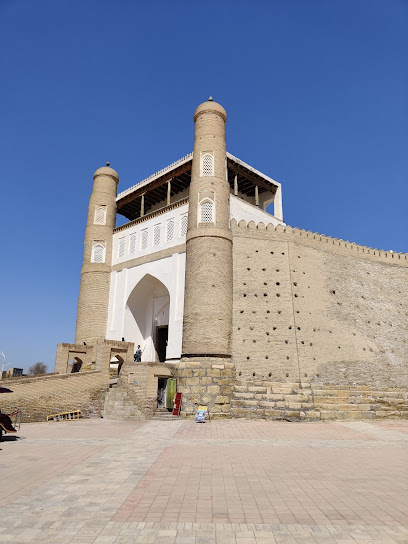
Old Bukhara
Explore Old Bukhara, where rich Uzbek culinary traditions meet ancient architecture in a mesmerizing travel experience.
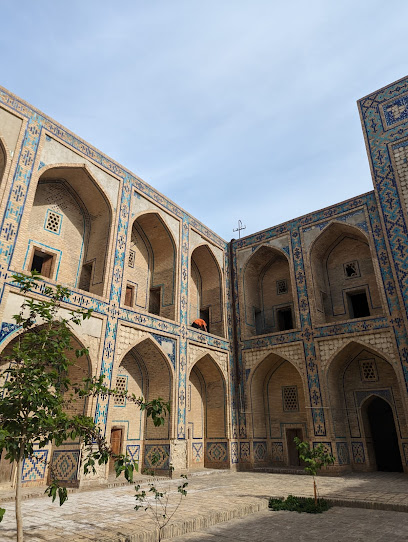
Lyabi House Hotel
Discover the charm and comfort of Lyabi House Hotel in Bukhara, a perfect blend of tradition and modern hospitality in Uzbekistan's historical heart.
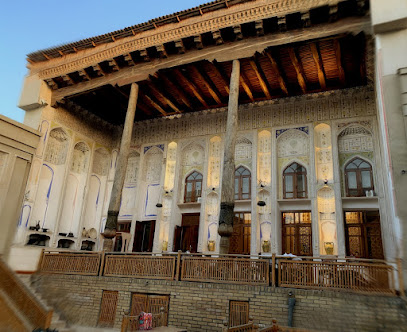
Chor Minor Madrasah
Experience the timeless beauty of Chor Minor Madrasah, a historical landmark in Bukhara, rich in culture and architectural splendor.
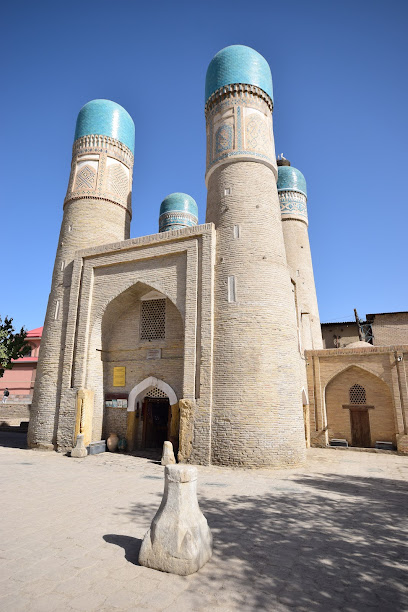
Kalan Mosque
Explore the architectural wonder of Kalyan Mosque in Bukhara, a historical gem showcasing the rich Islamic heritage of Uzbekistan.
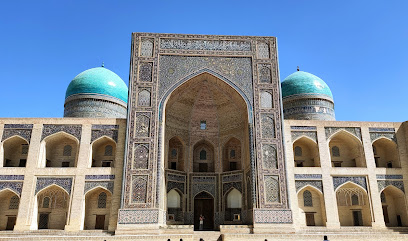
Kalon Tower
Discover the stunning Kalon Tower in Bukhara, Uzbekistan, a historical landmark showcasing exquisite architecture and rich cultural heritage.
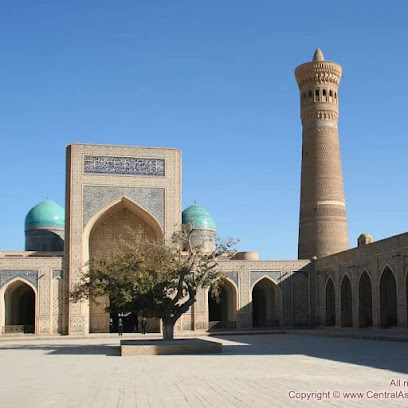
Sitori-i-Mokhi Khosa palace
Explore the enchanting Sitori-i-Mokhi Khosa Palace in Bukhara, a historical masterpiece that embodies the rich culture and heritage of Uzbekistan.
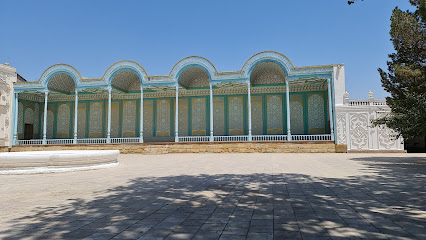
Ismail Samani Mausoleum
Explore the Ismail Samani Mausoleum in Bukhara, a stunning 10th-century landmark that exemplifies the beauty of ancient Persian architecture and history.
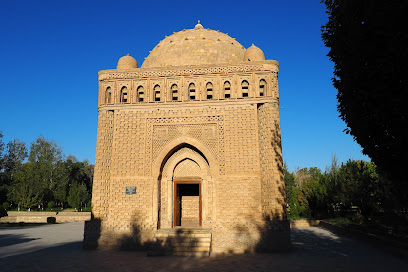
Şahı Nakşıbend Behaeddin-i Buhari Hazretleri
Explore the spiritual heart of Bukhara at Şahı Nakşibend Behaeddin-i Buhari Hazretleri, a historical gem for pilgrims and tourists alike.
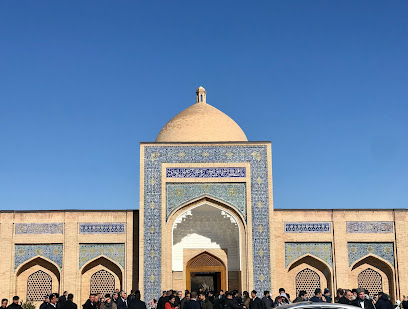
Ulugʻbek madrasasi
Explore the architectural marvel of Ulugbek Madrasasi in Bukhara, a symbol of cultural heritage and Islamic scholarship in Uzbekistan.
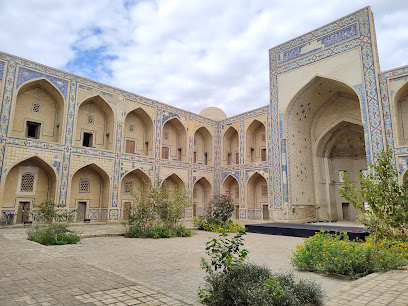
Chor Bakr Memorial Complex
Explore the tranquility of Chor Bakr Memorial Complex, a historical treasure in Bukhara Region, Uzbekistan, showcasing stunning architecture and rich cultural heritage.
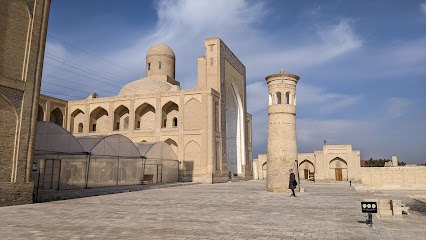
Bolo Hauz Mosque
Explore the breathtaking Bolo Hauz Mosque in Bukhara, a stunning blend of intricate artistry and serene atmosphere, reflecting the rich Islamic heritage of Uzbekistan.
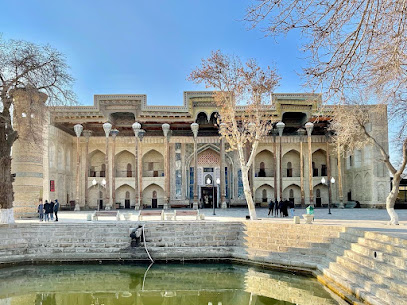
Mir-i-Arab Madrasa
Explore the Mir-i-Arab Madrasa, a stunning blend of history and spirituality in Bukhara, showcasing intricate Islamic architecture and a vibrant atmosphere.
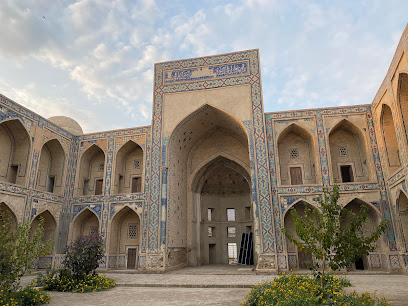
Lyabi Khause Square
Explore the enchanting Lyabi Khause Square in Bukhara, a UNESCO Heritage site blending rich history with vibrant local culture.
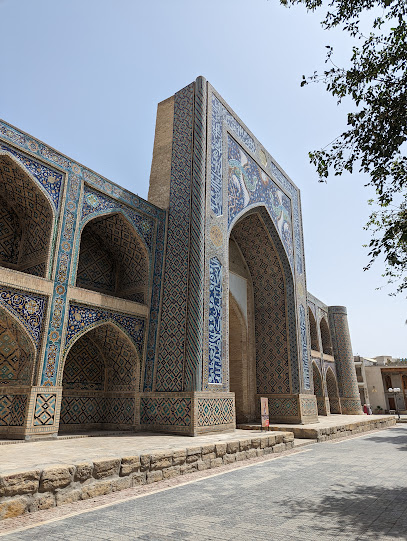
Samonids Recreation Park
Experience the tranquility of nature and rich history at Samonids Recreation Park in Bukhara, Uzbekistan, where beauty and culture meet.
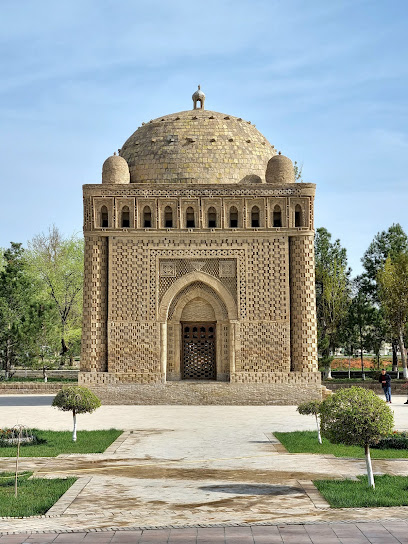
Unmissable attractions to see
Ark of Bukhara
Explore the Ark of Bukhara, a historical fortress that captures the essence of Uzbekistan's rich past and stunning architecture.
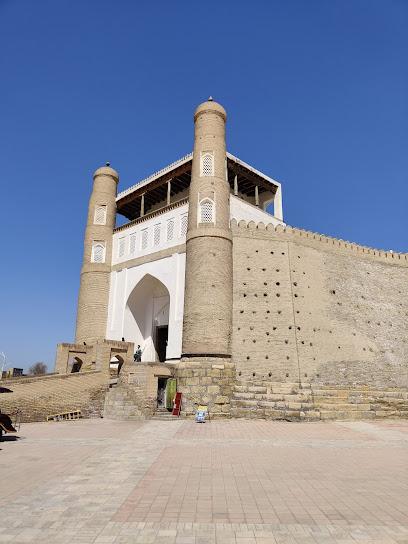
Kalan Mosque
Explore the Kalyan Mosque, a stunning example of Islamic architecture in Bukhara, Uzbekistan, featuring intricate tile work and a towering minaret.
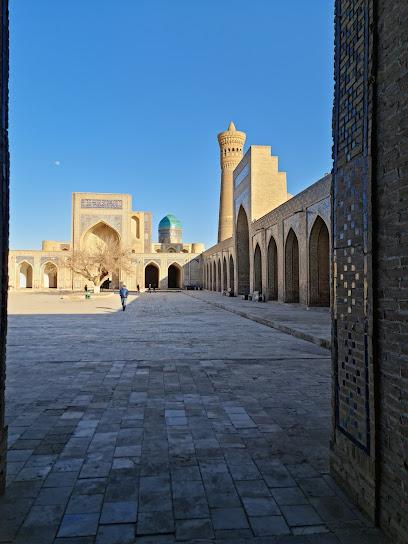
Sitori-i-Mokhi Khosa palace
Explore the enchanting Sitori-i-Mokhi Khosa Palace, a historical gem in Bukhara showcasing stunning architecture and rich cultural heritage.
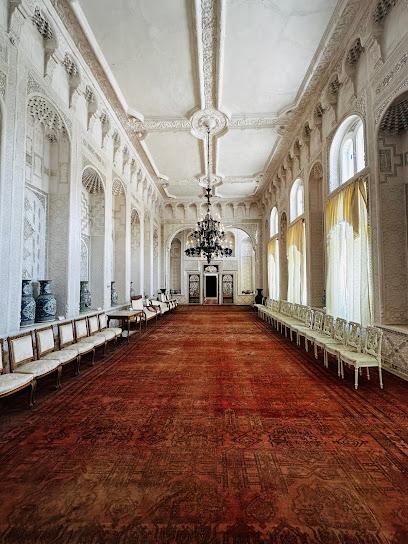
Ulugʻbek madrasasi
Discover the Ulugbek Madrasah in Bukhara, a stunning historical landmark celebrating the architectural brilliance of the Timurid era and the Silk Road's scholarly legacy.
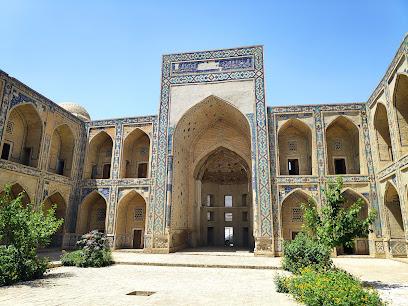
Chor Bakr Memorial Complex
Explore the captivating Chor Bakr Memorial Complex in Bukhara Region, a historical gem that showcases Uzbekistan's rich Islamic heritage and architectural beauty.
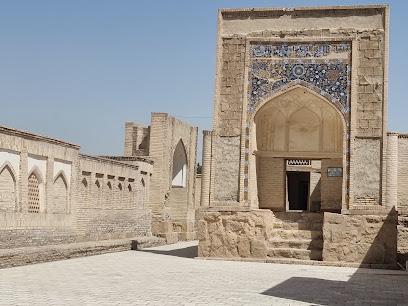
Bolo Hauz Mosque
Discover the breathtaking Bolo Hauz Mosque in Bukhara—an architectural masterpiece embodying Uzbekistan's rich history and vibrant culture.
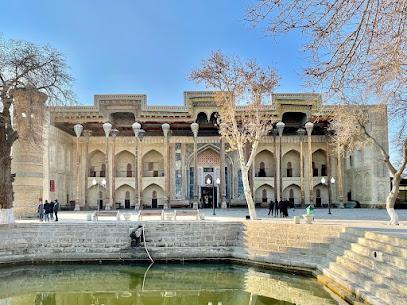
Samonids Recreation Park
Experience the beauty and tranquility of Samonids Recreation Park, a must-visit oasis in Bukhara, Uzbekistan for nature lovers and families.
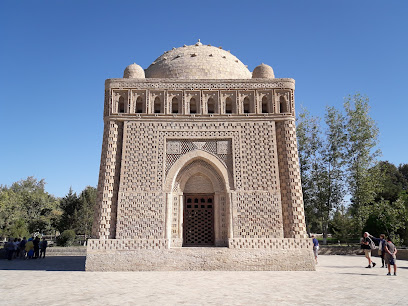
Chashmai Ayub Mausoleum
Explore the enchanting Chashmai Ayub Mausoleum, a historic sanctuary of spirituality and stunning architecture in Bukhara, Uzbekistan.
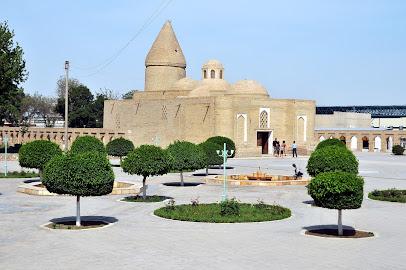
Zindan
Experience the captivating history of Bukhara at Zindan, a museum that reveals the rich cultural heritage of Uzbekistan.
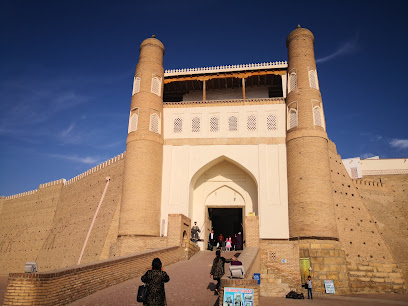
Nadir Divan Begi Madrasah
Discover the architectural splendor and cultural significance of Nadir Divan Begi Madrasah in Bukhara, a treasure of Uzbekistan's rich heritage.
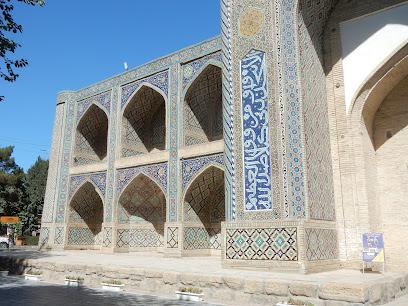
Toki Sarrofon
Explore Toki Sarrofon, an iconic historical landmark in Bukhara, Uzbekistan, where culture, history, and vibrant market life converge.
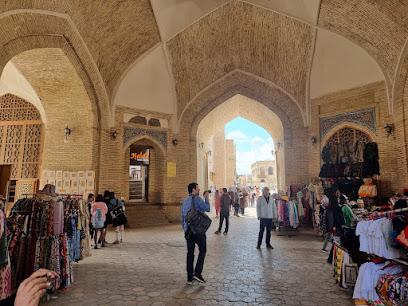
Bozori Kord Bathhouse
Experience the essence of Uzbek culture at Bozori Kord Bathhouse, a historical gem in Bukhara for relaxation and rejuvenation.
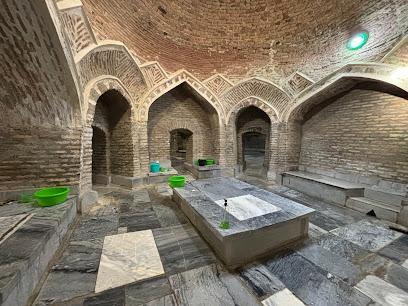
Fayzulla Khodjaev Museum
Discover the legacy of Fayzulla Khodjaev at Bukhara's gem, a museum rich in culture and history, perfect for every traveler.
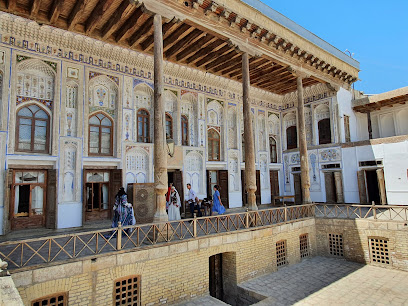
Qo'sh Madrasa
Discover the enchanting Qo'sh Madrasa in Bukhara, a stunning historical landmark showcasing the beauty of Islamic architecture and rich cultural heritage.
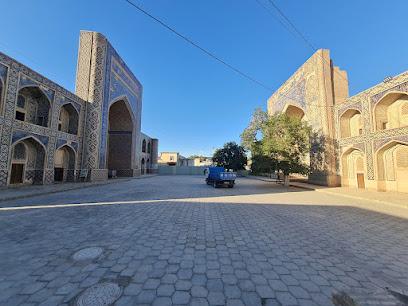
Bukhara Tower
Explore the breathtaking Bukhara Tower, a symbol of Uzbekistan's rich heritage and stunning architectural artistry, located in the heart of Bukhara.
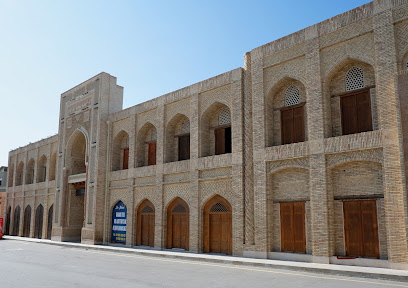
Essential places to dine
Old Bukhara
Experience the enchanting blend of history and cuisine in Old Bukhara – where every corner reveals a story waiting to be discovered.
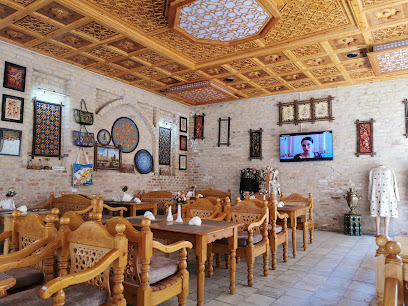
Chalet
Discover authentic Uzbek cuisine at Chalet in Bukhara – where tradition meets taste in a cozy dining atmosphere.
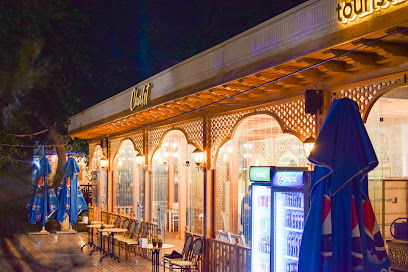
Ayvan
Discover authentic Uzbek cuisine at Ayvan in Bukhara - where tradition meets modernity in every dish.
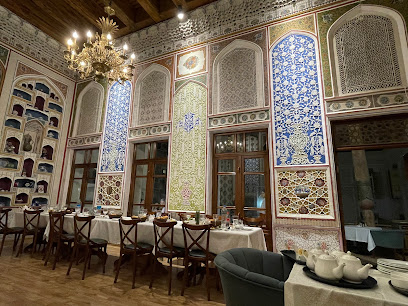
The Plov
Discover authentic Uzbek cuisine at The Plov in Bukhara - where tradition meets flavor in every delicious bite.
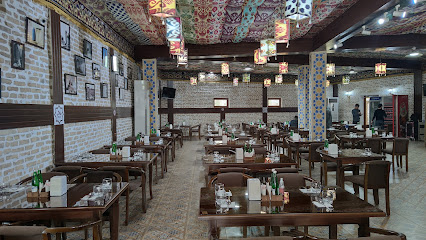
Chinar
Experience authentic Uzbek cuisine at Chinar in Bukhara - where tradition meets taste in every delightful dish.
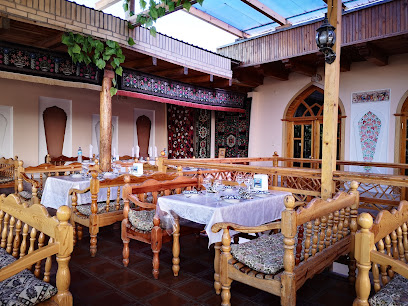
Chinor
Experience the rich flavors of traditional Uzbek cuisine at Chinor in Bukhara—where every meal is a delightful journey into local culinary heritage.
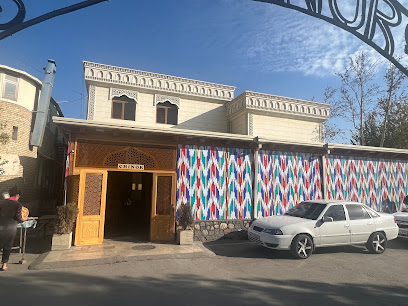
Bella Italia
Experience authentic Italian cuisine at Bella Italia in Bukhara – where every dish tells a story.
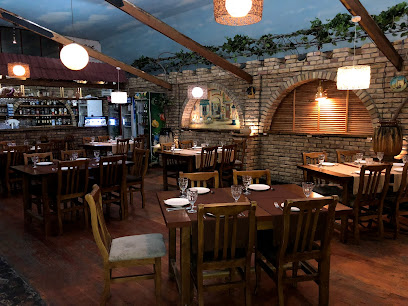
Temir's
Experience authentic Uzbek cuisine at Temir's in Bukhara – where every meal tells a story.
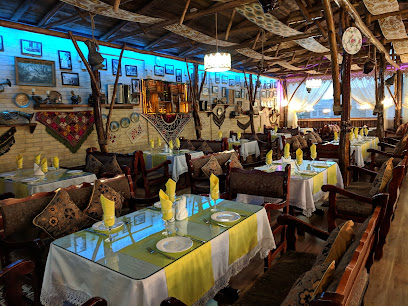
Minzifa
Experience authentic Uzbek cuisine at Minzifa in Bukhara – a culinary gem showcasing traditional flavors in a vibrant setting.
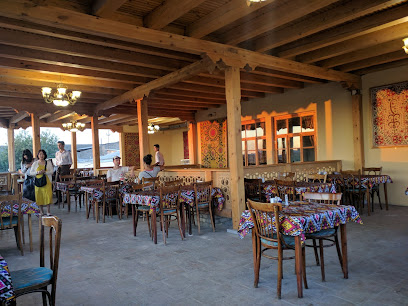
CHOR-BAKR KAFE TEMUR OTA
Experience authentic Uzbek cuisine at Chor-Bakr Kafe Temur OTA in Bukhara—where tradition meets taste in every dish.
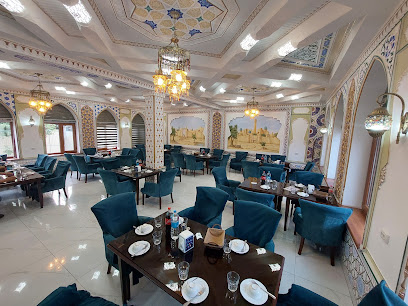
Joy chaikhana lounge
Discover the tranquil charm and authentic flavors at Joy Chaikhana Lounge in Bukhara - your perfect retreat for Uzbek tea and cuisine.
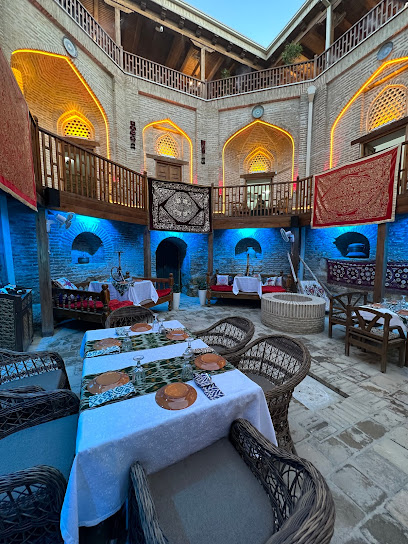
Dilkor (Лагманная )
Discover authentic Uzbek flavors at Dilkor in Bukhara - where tradition meets taste.
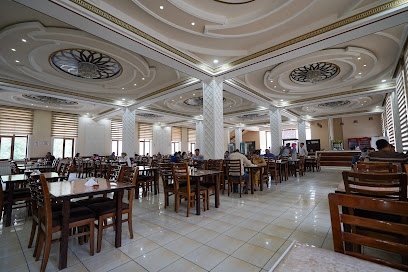
Mavrigi Restaurant - Chicha Bar
Experience authentic Uzbek cuisine in a vibrant atmosphere at Mavrigi Restaurant - Chicha Bar in Bukhara.
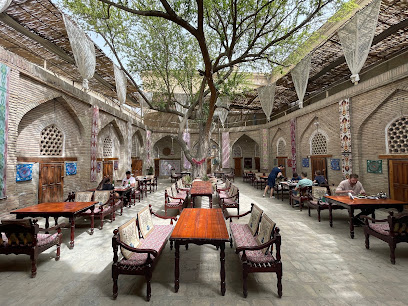
Yapona-mama
Experience authentic Japanese flavors at Yapona-mama in Bukhara, where exquisite sushi meets warm hospitality in an inviting atmosphere.
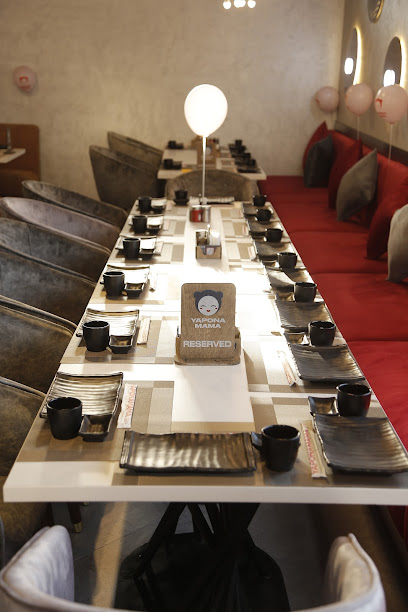
Zaytoon
Discover authentic Uzbek cuisine at Zaytoon in Bukhara – where tradition meets taste in a warm and welcoming atmosphere.
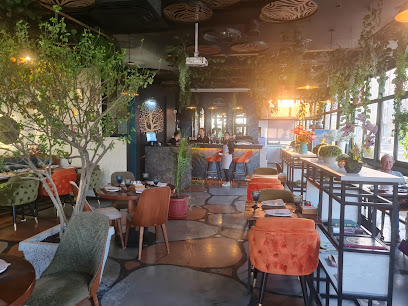
Markets, malls and hidden boutiques
Bukhara Mall
Experience the vibrant shopping atmosphere at Bukhara Mall, where tradition meets modernity in the heart of Uzbekistan.
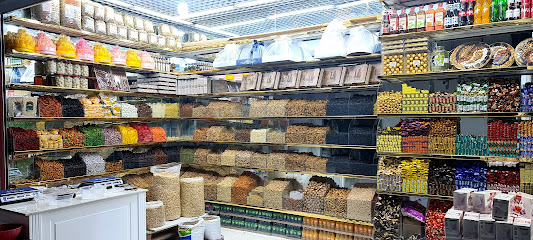
Monika
Discover Monika Shopping Mall in Bukhara: A vibrant shopping experience with local and international brands, dining, and cultural charm.
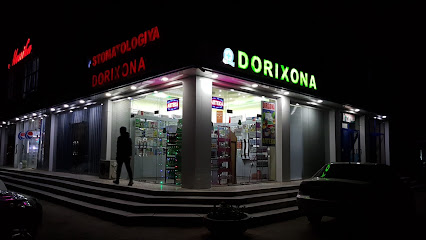
Iklima Boutique
Discover unique clothing and accessories at Iklima Boutique in Bukhara, where local culture meets contemporary fashion.
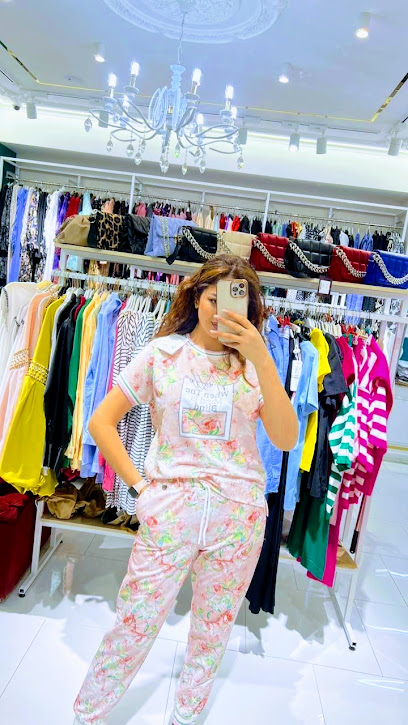
Muslima boutique Bukhara
Discover unique Uzbek fashion at Muslima Boutique in Bukhara, where tradition meets modern elegance in every garment.
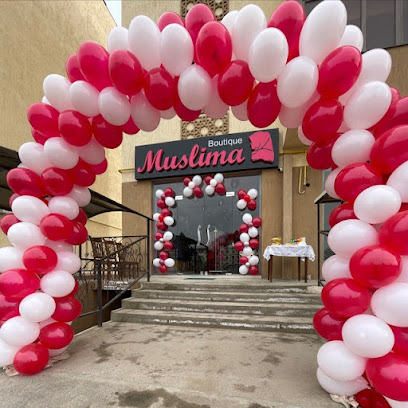
Enrico Marinelli
Discover the essence of Uzbek fashion at Enrico Marinelli, where tradition meets contemporary style in the heart of Bukhara.
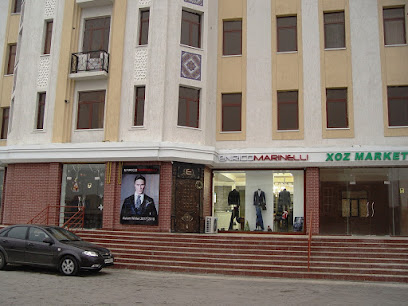
Madina
Discover the enchanting Madina market in Bukhara, where local crafts and vibrant culture come together for an unforgettable shopping experience.
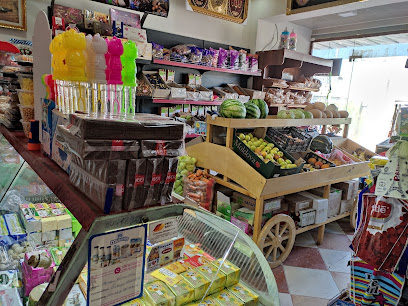
OldBukharaBoutique
Explore unique youth clothing that blends modern fashion with traditional Uzbek culture at Old Bukhara Boutique in Bukhara, Uzbekistan.
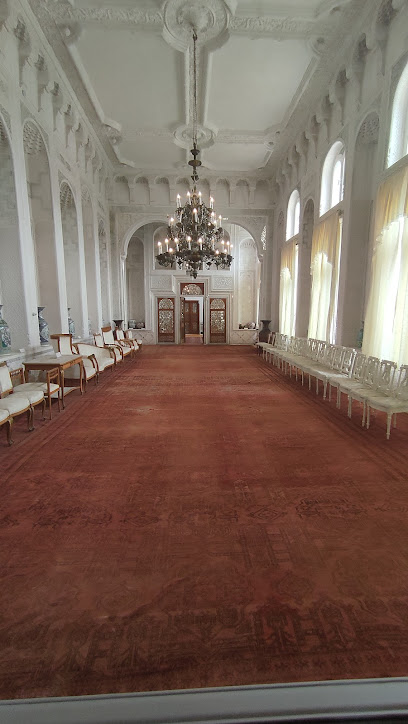
Nancy Boutique Shop
Explore the artistic charm of Bukhara at Nancy Boutique Shop, where unique handcrafted treasures await every traveler seeking a piece of Uzbekistan.
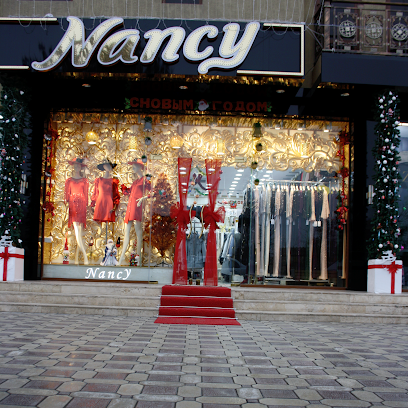
Zolotoy Bazar
Explore the exquisite jewelry and rich traditions of Uzbekistan at Zolotoy Bazar, a must-visit destination in Bukhara.

Galereya Buxoro
Explore Galereya Buxoro in Bukhara, a vibrant shopping mall blending local craftsmanship with modern retail in the heart of Uzbekistan.
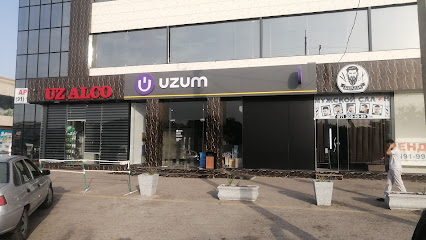
SAMIRA hsheusvjbshdgdghsv
Experience the vibrant culture of Bukhara at SAMIRA, where authentic Uzbek crafts and unique treasures await every traveler.
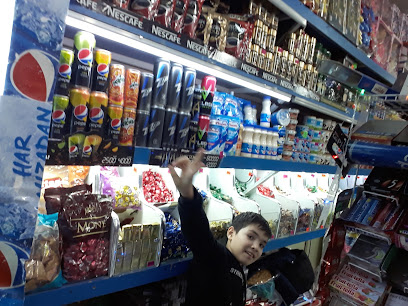
Sovg'alar do'koni/Gift Shop
Explore authentic Uzbek handicrafts and unique souvenirs at Sovg'alar do'koni in Bukhara, a must-visit gift shop for every traveler.
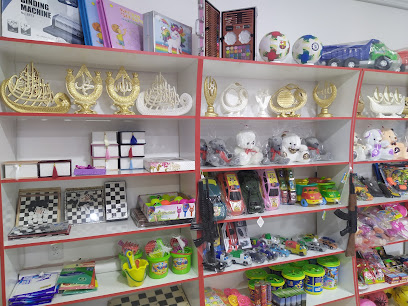
Handmade Shop Bukhara
Explore the vibrant culture of Uzbekistan through exquisite handmade crafts at Handmade Shop Bukhara, the ideal spot for authentic souvenirs.
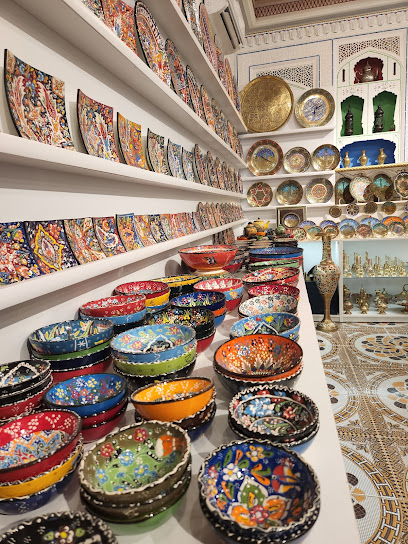
BEST SHOP
Explore the vibrant clothing collections at BEST SHOP, Bukhara's premier destination for local fashion and unique designs.
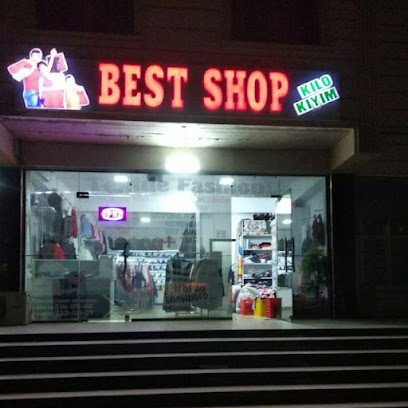
Fiesta
Explore Fiesta in Bukhara for unique gifts and authentic Uzbek handicrafts that capture the essence of your travels.
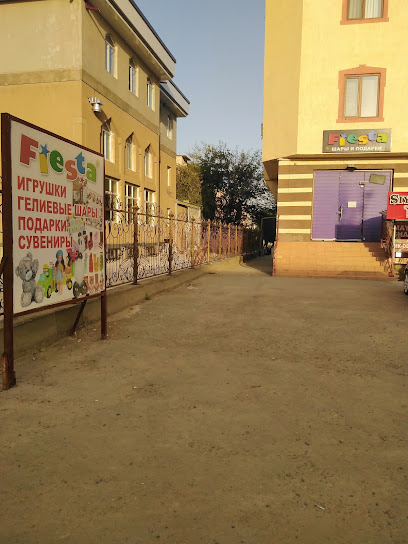
Essential bars & hidden hideouts
Mavrigi Restaurant - Chicha Bar
Discover the authentic taste of Uzbekistan at Mavrigi Restaurant - Chicha Bar, where tradition meets modern dining in Bukhara's vibrant atmosphere.
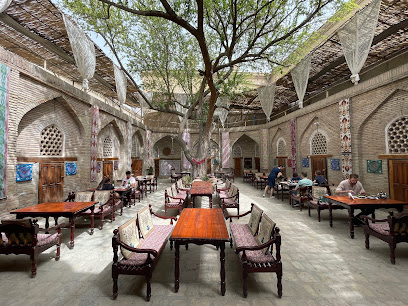
Beer Pub (Razlivnoe Pivo) PIV BAR
Explore the vibrant beer culture of Bukhara at Beer Pub (Razlivnoe Pivo) PIV BAR, offering an authentic taste of local brews in a lively atmosphere.
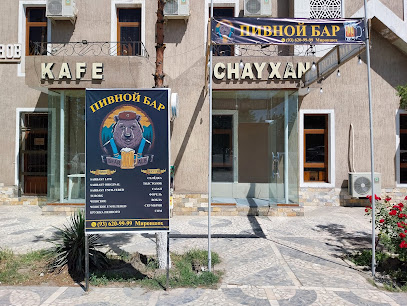
Rusalka
Discover Rusalka, a charming bar in the heart of Bukhara, offering a unique blend of local drinks and a warm, inviting atmosphere.
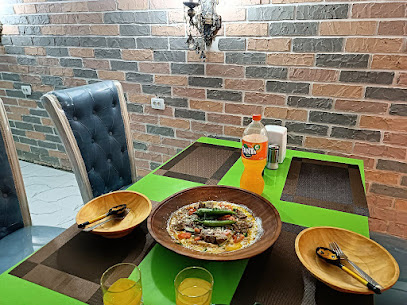
New york
Experience the vibrant pub culture of Bukhara, where tradition and modernity blend in a lively atmosphere filled with local flavors.
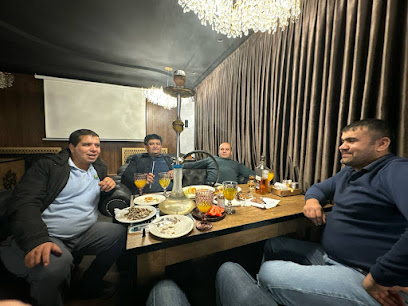
Shafran
Experience Bukhara's vibrant nightlife at Shafran, a bar blending local charm with a modern twist in the heart of Uzbekistan's historic city.
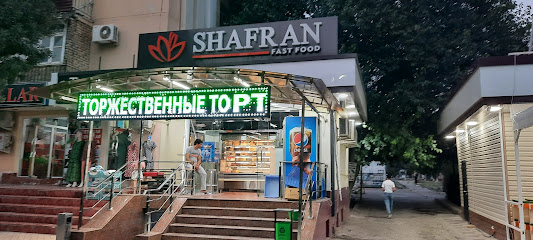
Sport Bar
Enjoy a lively atmosphere at Bukhara's Sport Bar, where sports, drinks, and local culture come together for an unforgettable experience.

Pivbar
Discover the vibrant atmosphere of Pivbar, Bukhara’s top bar offering a delightful selection of drinks and a taste of local culture.
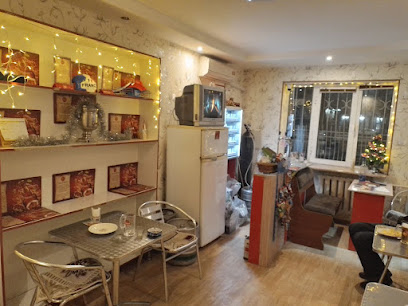
Pivnoy Bar Melodiya
Discover the lively spirit of Bukhara at Pivnoy Bar Melodiya, where local flavors meet a vibrant nightlife experience.
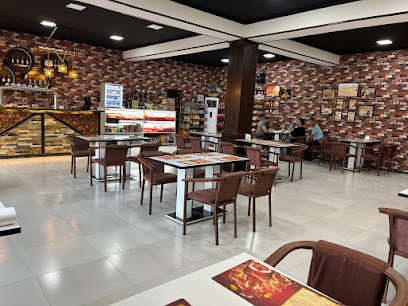
Jiguli bar | Жигули бар
Discover the vibrant atmosphere and authentic flavors at Jiguli Bar, a must-visit bar in the heart of Bukhara, Uzbekistan.
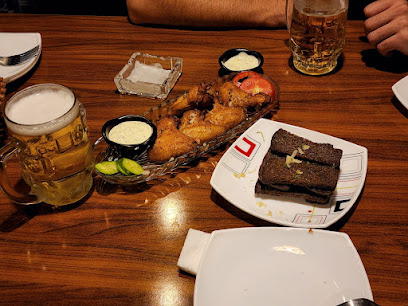
Kafe MARUTA
Discover the charm of Kafe MARUTA, a cozy bar in Bukhara, Uzbekistan, where friendly service meets a relaxed atmosphere for the perfect evening.

Restoran PARUS
Discover the heart of Uzbek cuisine at Restoran PARUS in Bukhara, where authentic flavors and warm hospitality await every visitor.
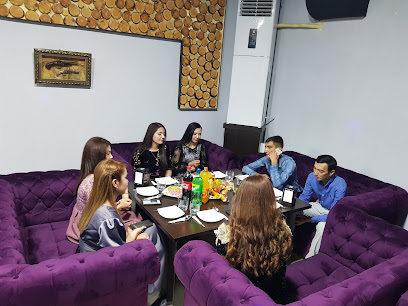
the miami lounge
Discover the vibrant nightlife at The Miami Lounge, a lively bar in Bukhara offering a unique blend of drinks and social experiences.
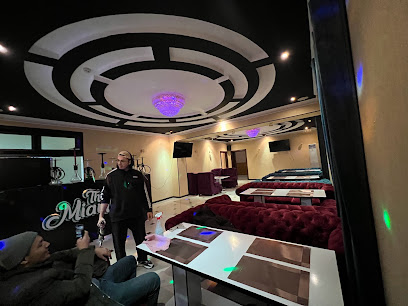
Boyka Hookah
Discover the vibrant nightlife at Boyka Hookah in Bukhara, where traditional charm meets contemporary relaxation in a welcoming atmosphere.

Magazin
Discover the vibrant atmosphere and refreshing drinks at Magazin, a charming bar in the heart of Bukhara, Uzbekistan.

Local Phrases
-
- HelloСалом
[Salom] - GoodbyeХайр
[Khayr] - YesҲа
[Ha] - NoЙўқ
[Yo'q] - Please/You're welcomeМарҳабба
[Marhabba] - Thank youРаҳмат
[Rahmat] - Excuse me/SorryКечиринг
[Kechiring] - How are you?Қалайсиз?
[Qalaysiz?] - Fine. And you?Жуда яхши. Сизни?
[Juda yaxshi. Sizni?] - Do you speak English?Сиз инглиз тилидами?
[Siz ingliz tilidami?] - I don't understandМени тушунмади
[Meni tushunmadi]
- HelloСалом
-
- I'd like to see the menu, pleaseМенюни кўрмоқчиман, илтимос
[Menyuni kormoqchiman, iltimos] - I don't eat meatМен гўсх тўғримадим
[Men g'asx to'g'rimadim] - Cheers!Сайёҳатларингизга!
[Sayohatlaringizga!] - I would like to pay, pleaseТўловни амалга ошираман, илтимос
[Tolovni amalga oshiraman, iltimos]
- I'd like to see the menu, pleaseМенюни кўрмоқчиман, илтимос
-
- Help!Ёрдам!
[Yordam!] - Go away!Ёпинг!
[Yoping!] - Call the Police!Полицияни чақиринг!
[Policiyani chaqiring!] - Call a doctor!Докторни чақиринг!
[Doktorni chaqiring!] - I'm lostМен қайсизман
[Men qaysizman] - I'm illМен касалман
[Men kasalman]
- Help!Ёрдам!
-
- I'd like to buy...Мен ...сотиб олишни истайман
[Men ...sotib olishni istayman] - I'm just lookingМен фақат кўрмоқчиман
[Men faqat kormoqchiman] - How much is it?Бу қачонга тура эмас?
[Bu qachonga tura emas?] - That's too expensiveБу жиддий нарх
[Bu jiddiy narx] - Can you lower the price?Сиз нархни тўғришингиз мумкинми?
[Siz narxni to'grishingiz mumkinmi?]
- I'd like to buy...Мен ...сотиб олишни истайман
-
- What time is it?Қачон?
[Qachon?] - It's one o'clockБир соат
[Bir soat] - Half past (10)Оннинг ўртаси
[Onning o'rtasi] - MorningЭрталаб
[Ertalab] - AfternoonКун ортаси
[Kun ortasi] - EveningКечаси
[Kechasi] - YesterdayКеча
[Kecha] - TodayБугун
[Bugun] - TomorrowЭртага
[Ertaga] - 1Бир
[Bir] - 2Икки
[Ikki] - 3Уч
[Uch] - 4Тўрт
[To'rt] - 5Беш
[Besh] - 6Олти
[Olti] - 7Етти
[Etting] - 8Саккиз
[Sakkiz] - 9Тўққиз
[To'qqiz] - 10Он
[On]
- What time is it?Қачон?
-
- Where's a/the...?...қа қандайда?
[...qa qandayda?] - What's the address?Манзилингиз қандай?
[Manzilingiz qanday?] - Can you show me (on the map)?Менга кўрсатсангиз (харитада)?
[Menga korsatsangiz (xaritada)?] - When's the next (bus)?Кейинги (автобус) қачон?
[Keyingi (avtobus) qachon?] - A ticket (to ....)Билет (....га)
[Bilet (....ga)]
- Where's a/the...?...қа қандайда?
History of Bukhara
-
Bukhara is one of the oldest cities in Central Asia, with origins dating back over 2,000 years. According to legend, it was founded by the Persian prince Siyavush. Archaeological evidence suggests that the city has been continuously inhabited since at least the 5th century BCE, making it a crucial center of trade and culture in the region.
-
The Samanid Dynasty, which ruled from 819 to 999 CE, marked a golden age for Bukhara. The city became a major center for Islamic culture and learning, often referred to as the 'Pillar of Islam.' The Samanid Mausoleum, one of the most iconic architectural landmarks in Bukhara, dates back to this period and is considered a masterpiece of early Islamic architecture.
-
In the early 13th century, Bukhara faced one of its darkest periods with the Mongol invasion led by Genghis Khan. In 1220, the city was sacked, and much of its population was killed or enslaved. Despite this devastation, Bukhara eventually recovered and continued to be a significant cultural and economic hub.
-
Under the rule of the Timurid Empire in the 14th and 15th centuries, Bukhara experienced a cultural renaissance. The city became a center for arts, science, and literature. It was during this period that the famous Ulugh Beg Madrasa was built, which attracted scholars and students from all over the Islamic world.
-
For centuries, Bukhara was a key stop on the Silk Road, the ancient trade route connecting the East and West. The city's bustling bazaars were filled with merchants trading silk, spices, and other goods. The architectural legacy of this era can be seen in the numerous caravanserais and trading domes that still stand today.
-
From the 16th century until the 20th century, Bukhara was the capital of the Bukharan Emirate. This period saw the construction of many of the city's iconic buildings, including the Ark Fortress, Bolo Haouz Mosque, and the Kalyan Minaret. The emirate was known for its relative independence and its role as a cultural and religious center in the region.
-
In 1868, Bukhara was conquered by the Russian Empire, becoming a protectorate. This marked the beginning of significant changes in the city's political and social structure. During the Soviet era, Bukhara underwent further transformations, including industrialization and modernization projects. Many of the city's historical buildings were preserved as part of Soviet efforts to promote cultural heritage.
-
Since gaining independence from the Soviet Union in 1991, Bukhara has become a symbol of Uzbekistan's rich cultural heritage. The city has been extensively restored and is now a UNESCO World Heritage Site. It continues to attract tourists and scholars alike, who come to explore its ancient monuments, vibrant markets, and rich history.
Bukhara Essentials
-
Bukhara is accessible via several modes of transportation. The nearest major airport is Bukhara International Airport (BHK), which has direct flights from Tashkent and several other international destinations. From Tashkent, you can also take a high-speed train (Afrosiyob) that connects to Bukhara in approximately 4 hours. Alternatively, long-distance buses and shared taxis are available for travel within Uzbekistan.
-
Bukhara’s old town is best explored on foot due to its compact size and pedestrian-friendly streets. For longer distances, taxis are readily available and relatively inexpensive. Ensure you agree on a fare before the journey or insist on using the meter. Public buses and marshrutkas (minibuses) also operate throughout the city. For a unique experience, consider taking a ride on a traditional horse-drawn cart.
-
The official currency of Uzbekistan is the Uzbekistani Som (UZS). While credit cards are accepted in some hotels and upscale restaurants, cash is the preferred method of payment, especially in local markets and small shops. ATMs are available throughout Bukhara, but it is advisable to carry sufficient cash, particularly when visiting remote areas. Currency exchange services can be found at banks and exchange offices.
-
Bukhara is generally a safe destination for tourists. However, as with any travel destination, it is important to take standard precautions. Avoid walking alone at night in poorly lit areas and keep an eye on your belongings in crowded places. While Bukhara does not have specific high-crime areas targeting tourists, it is always best to stay vigilant and aware of your surroundings.
-
In case of emergency, dial 103 for medical emergencies and 102 for police assistance. Bukhara has several medical facilities and pharmacies where you can purchase over-the-counter medications. It is recommended to have travel insurance that covers medical emergencies. For minor health issues, local pharmacies can provide necessary medications.
-
Fashion: Do dress modestly, especially when visiting religious sites. Avoid wearing revealing clothing. Religion: Do respect local customs and traditions. Remove your shoes before entering mosques and cover your head if required. Public Transport: Do be respectful and offer your seat to elderly passengers. Don’t eat or drink on public transport. Greetings: Do greet people with a handshake. A slight bow of the head is also a sign of respect. Eating & Drinking: Do try local delicacies and accept food offerings graciously. Don’t refuse hospitality, as it is considered impolite.
-
To experience Bukhara like a local, visit the local bazaars such as the Toki Zargaron and Toki Sarrafon, where you can buy traditional crafts and spices. Engage with locals, as they are often friendly and eager to share stories about the city's history and culture. Don’t miss visiting the Ark Fortress and the Bolo Haouz Mosque, which offer a glimpse into Bukhara’s rich heritage. For a unique experience, attend a traditional music performance or a puppet show at the local theaters.
Trending Landmark in Bukhara
-
Ark of Bukhara
-
Old Bukhara
-
Lyabi House Hotel
-
Chor Minor Madrasah
-
Kalan Mosque
-
Kalon Tower
-
Sitori-i-Mokhi Khosa palace
-
Ismail Samani Mausoleum
-
Şahı Nakşıbend Behaeddin-i Buhari Hazretleri
-
Ulugʻbek madrasasi
-
Chor Bakr Memorial Complex
-
Bolo Hauz Mosque
-
Mir-i-Arab Madrasa
-
Lyabi Khause Square
-
Samonids Recreation Park
Nearby Cities to Bukhara
-
Things To Do in Navoi
-
Things To Do in Qarshi
-
Things To Do in Samarkand
-
Things To Do in Shakhrisabz
-
Things To Do in Panjakent
-
Things To Do in Djizak
-
Things To Do in Jizzakh
-
Things To Do in Bayramaly
-
Things To Do in Mary
-
Things To Do in Tursunzoda
-
Things To Do in Urgench
-
Things To Do in Istaravshan
-
Things To Do in Khiva
-
Things To Do in Dushanbe
-
Things To Do in Mazar-i-Sharif













